Alton Waye was executed by the State of Virginia for the sexual assault and murder of a 61 year old woman
According to court documents Alton Waye would break into a Virginia home where he would sexually assault and murder Lavergne Marshall who was stabbed over forty times and was beaten til she was unrecognizable
Alton Waye would be arrested, convicted and sentenced to death
Alton Wade would be executed by way of the electric chair on August 30 1989
Alton Waye Photos

Alton Waye FAQ
When was Alton Waye executed
Alton Waye was executed on August 30 1989
How was Alton Waye executed
Alton Waye was executed by way of the electric chair
Alton Waye Case
Alton Waye, baptized the night before he was executed for murdering a 61-year-old widow, peacefully accepted his fate but made one point clear in his last words: ‘What’s about to occur here is a murder.’
With 10 years of appeals exhausted, the 34-year-old Army veteran skipped his final meal Wednesday to take communion and looked skyward for inspiration from his newfound God while being strapped to the golden oak electric chair.
‘I would like to express that what’s about to occur here is a murder,’ Waye said. ‘I want everybody to know I forgive the people involved in this murder, that I don’t hate nobody, and I love you.’
Waye, who held the record for longest stint on Virginia’s death row, was condemned for the Oct. 14, 1977, assault on LaVergne Marshall. The Kenbridge widow was beaten, raped and stabbed 42 times before her nude body was dumped into a bathtub and doused with bleach.
He was pronounced dead at 11:05 p.m. EDT after receiving two 55-second surges of 2,525 volts of electricity, said State Penitentiary Operations Manager John Coble.
Waye was the eighth person to die in the state’s electric chair and the 117th person to be executed in the United States since the Supreme Court lifted the ban on capital punishment in 1976.
Outside the prison, several dozen death penalty opponents held a silent candlelight vigil while across the street a few death penalty supporters shouted and carried signs.
‘I feel sorry for his mother because you can’t help what your children do,’ said Mary Jones, 65, who carried a sign that said, ‘Fry the Murderer.’
Henry Gerrard Sr., chairman of the Virginia Association to Abolish the Death Penalty, called it ‘a sad day for the commonwealth.’
Based largely on his confession — Waye’s contention the sex was consensual was overwhelmed by grisly photographs detailing the savage beating — he was convicted in 10 minutes.
It took jurors only 25 minutes to recommend death, and despite evidence called ‘overwhelming’ by one of the 30 judges who heard his case in at least 17 different hearings, appeals dragged on for 11 years.
The cost to Virginia for his years on death row was roughly $500,000, including prison room and board and legal fees. Waye’s defense was financed by federal taxpayers, the state attorney general’s office said.
Shortly before 8 p.m. EDT, the Supreme Court by a vote of 7-2 cleared the way for the execution, denying two last-minute appeals related to faulty jury instructions and Waye’s mental competence. Justices William Brennan and Thurgood Marshall dissented.
Earlier in the day, the 4th U.S. Circuit Court of Appeals also refused to stay the execution or allow more time for Waye’s lawyers to investigate the possibility that Waye’s drinking companion on the night of the murder could have been implicated in the crime.
Describing Waye as a ‘poor black man’ with a diminished mental capacity, NAACP lawyer Richard Burr said ‘within the last few weeks … we have conducted the investigation that has never been done.’
But the three-judge panel rejected the arguments, saying, ‘There must be some finality … and the final stage has been reached in this case.’
Gov. Gerald Baliles declined Wednesday to halt the execution, saying, ‘I do not believe the governor’s power of executive clemency should be exercised in this instance.’
Assistant State Attorney General Linwood Wells said he was incredulous at the flurry of claims, particularly defense contentions that someone else could be responsible for the crime.
Waye’s attorney, Gerald Zerkin, said the Virginia Supreme Court refused to consider a key point of evidence because it was not brought up at the original trial. In federal appeals, Waye’s attorneys could not bring up the exclusion of psychiatric testimony because it was ‘a state evidentiary matter.’









